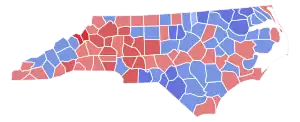1984 United States Senate election in North Carolina
The North Carolina United States Senate election of 1984 was held on November 6, 1984 as part of the nationwide elections to the Senate, and coinciding with the 1984 presidential election. The election was fought between the Republican incumbent Jesse Helms and then-incumbent Democratic Governor Jim Hunt. Helms won the election, the most expensive non-presidential election in United States history up to that point, by a margin significantly reduced from the margin that Helms achieved in 1978.
| |||||||||||||||||
| |||||||||||||||||
 County Results Helms: 50-60% 60-70% 70-80% Hunt: 40–50% 50–60% 60–70% | |||||||||||||||||
| |||||||||||||||||
| Elections in North Carolina |
|---|
 |
Primaries
Republican primary
| Party | Candidate | Votes | % | |
|---|---|---|---|---|
| Republican | Jesse Helms | 134,675 | 90.65% | |
| Republican | George Wimbish | 13,799 | 9.35% | |
| Turnout | 148,574 | |||
Democratic primary
Hunt easily defeated businessman Thomas Allred, a supporter of Lyndon Larouche, to win the Democratic nomination.[2]
| Party | Candidate | Votes | % | |
|---|---|---|---|---|
| Democratic | Jim Hunt | 655,429 | 77.48% | |
| Democratic | Thomas Allred | 126,841 | 14.99% | |
| Democratic | Harrill Jones | 63,676 | 7.53% | |
| Turnout | 845,946 | |||
General election
Campaign
Hunt had a commanding lead in opinion polls for much of the campaign, with one poll in 1983 putting him nineteen points clear of Helms.[3] However, that was changed by the most bitterly contested election in the country that year.[3] Hunt ran a campaign ad connecting Helms to death squads in El Salvador through his association with the Nationalist Republican Alliance, for whom Roberto d'Aubuisson had recently run for the President of El Salvador.[3] In the short time before election day, however, the highly popular incumbent US President Ronald Reagan gave Helms a significant boost[4] by campaigning for him and running a local TV ad praising Helms and asking registered voters in North Carolina to re-elect him.[5]
The election cost a total of $26,379,483 in total reported spending (over twelve times as much as the 1980 race), of which, 64% ($16.9m) was spent by Helms.[6]
This election is remembered as "one of North Carolina's most infamous political battles" and "as a prototype of the no-holds-barred brawls that typify a strand of modern-day partisan politics, polarizing voters along distinct ideological lines."[7]
Results
| Party | Candidate | Votes | % | ||
|---|---|---|---|---|---|
| Republican | Jesse Helms (incumbent) | 1,156,768 | 51.7% | ||
| Democratic | Jim Hunt | 1,070,488 | 47.8% | ||
| Libertarian | Bobby Emory | 9,302 | 0.4% | ||
| Socialist Workers | Kate Daher | 2,493 | 0.1% | ||
| Turnout | 2,239,051 | ||||
| Republican hold | |||||
A study by Voters Education Project in Atlanta showed that Helms received 63 percent of the white vote and was particularly successful in small towns and rural areas, while receiving less than 1 percent of the black vote in 35 almost-all-black precincts.[8] Hunt got 37 percent of the white and 98.8 percent of the black vote, according to VEP. But only 61 percent of registered blacks voted, down from 63 percent in 1980."[8]
See also
References
- "North Carolina DataNet #46" (PDF). University of North Carolina. April 2008. Archived from the original (PDF) on July 25, 2008. Retrieved June 12, 2009.
- Newspapers.com archive
- Joseph N., Boyce; Lamar, Jacob V. (September 24, 1984). "The Old South vs. the New". Time. Retrieved June 10, 2009.
- http://www.unctv.org/U.S%5B%5D. Senatorno/peopleevents/events1.html
- Ronald Reagan ad for Jesse Helms
- "North Carolina DataNet #25" (PDF). University of North Carolina. Archived from the original (PDF) on 2008-07-25. Retrieved June 12, 2009.
- NCpedia: Helms-Hunt Senate race
- Bill Peterson (November 18, 1984), "Jesse Helms' Lesson for Washington", The Washington Post, retrieved January 16, 2017

.jpg.webp)